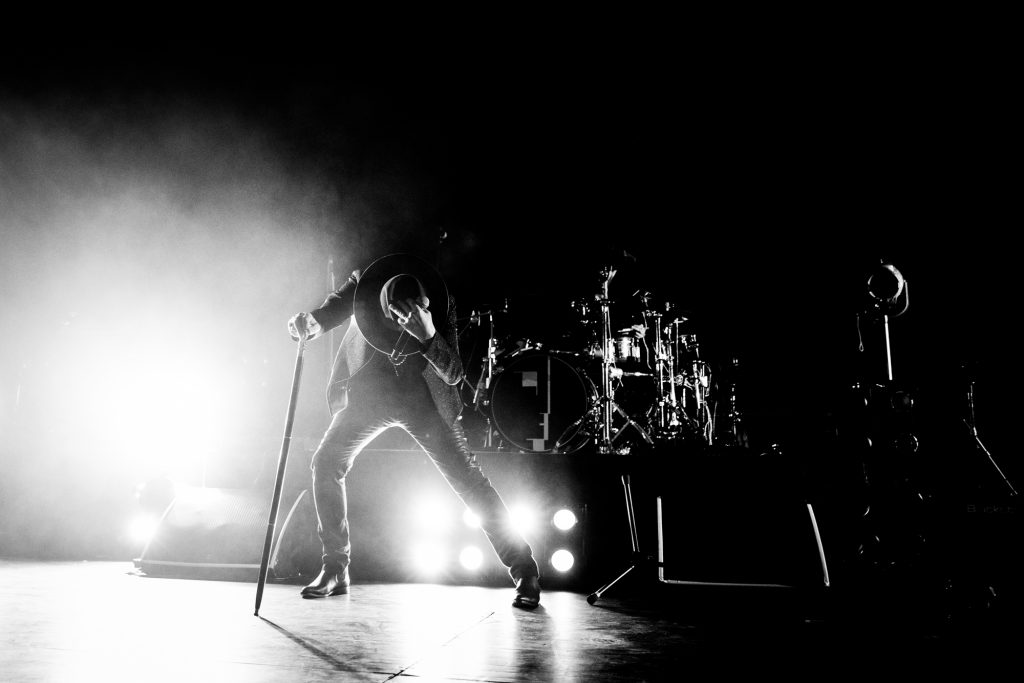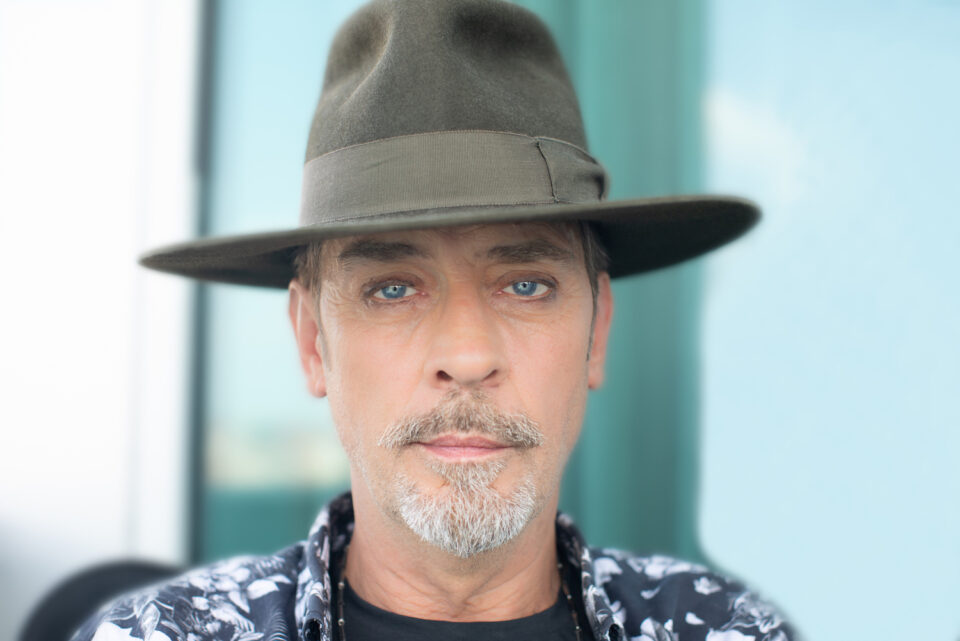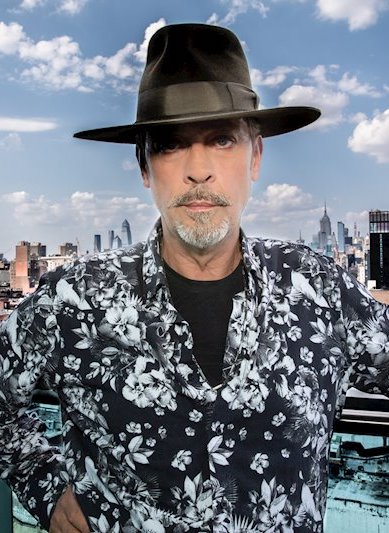After rising to worldwide fame as the lead singer of the iconic post-punk pioneers Bauhaus, Peter Murphy became one of the most recognizable and influential frontmen in alternative rock. But when that band first broke up in the mid-’80s, Murphy launched his equally successful solo career, releasing several singles that became worldwide hits. Then, after putting out the album Lion in 2014, it seemed as if Murphy’s days of releasing solo material might be over. He hadn’t disappeared, though—he continued to play live, and reunited with his Bauhaus bandmates over the years (initially with the release of their fifth album Go Away White in 2008, most recently touring together in 2022). He put out a couple of live albums, as well as a collection of remixes. But fans of Murphy’s solo work were left to wonder if he’d ever release more original material.
Then, last winter, Murphy suddenly emerged with the single “Let the Flowers Grow,” a duet with Boy George. And last week marked the release of Silver Shade via Metropolis Records, his first new full-length in over a decade. The album’s 11 songs reveal that Murphy is as commanding a performer as ever, with his powerful baritone and poetic lyrics still intact. Musically, this album sounds like a continuation of his classic 1989 album Deep, but with a decidedly modern vibe. There are also appearances from notable guest musicians, including Trent Reznor of Nine Inch Nails and Justin Chancellor of Tool. The album was produced by Youth, who’s known for his work as the bassist for Killing Joke and who also produced Lion.
Reaching out from his home in Turkey, Murphy tells me what made him decide to resurrect his recording career, how he approaches his creative process, and how he views his legacy.

photo Jolene Sian
How did you know it was the right time to do another album?
It wasn’t about timing in a commercial sense. Since I’m a recording artist, I need to produce an album every so often, and Silver Shade was just that. Time had come for it. I suppose when something builds up in that direction, it’s time to go into the recording studio. It’s more like the need arrives, and I follow it.
Are there any particular themes you’re hoping to get across with these new songs?
I don’t write with a fixed message in mind. The themes tend to reveal themselves when one is in the studio and the songwriting process is coming to completion. But yes, certain things always surface: identity, conflict, the spiritual side of things, dislocation. I’ve learned not to over-explain them. The listener will take what they need, and that’s as it should be. It’s more about holding a mirror up than giving answers.
Did you approach writing and recording this album any differently than you did with your previous releases?
Yes, a bit. Each album asks for its own process. This time, I wanted to keep things more raw, more immediate—less layering for the sake of it. Maybe I trusted the initial ideas more and didn’t overwork them. In the past, I might have gone for more complexity. More about instinct than calculation. Now I’m more interested in capturing the moment, flaws and all. It’s more human that way. And, of course, being with Youth gave me that ease.

photo by Jolene Siana
Your sound is so distinctive. When you began your solo career, how did you figure out what your own style should be?
I didn’t plan a style. Coming out of Bauhaus, it was about figuring out what was actually mine. The voice, the lyrics—that was always there. But without the band, I had to ask what I really wanted to say. Maybe less about performance and the theatrics that goes with it; more about substance. It was about stripping everything back and seeing what came through. The style came through the years, by doing, finding what felt real, what didn’t. I suppose you find your sound by not chasing one. The style came from pushing into new territory and seeing what stuck and what felt natural, to be honest.
It seems like a lot of artists start to run out of good ideas after a while, but that doesn’t seem to be a problem for you. How do you stay inspired?
Firstly, I wouldn’t consider myself inspired all the time as you suggest. It comes and goes, like the tide. So I wouldn’t define it as “running out” of ideas—ideas are always there if you stay awake to them, or in touch with an inner part of you, I suppose. Secondly, it’s also about a kind of a discipline—about showing up, working, spending hours in the studio (which I am not that good at—I’m too impatient). Maybe thinking outside your comfort zone at times is also necessary. That may bring in new ideas.
It also seems like, at this point, people have pretty high expectations for your work. Do you ever feel under pressure to live up to that?
Actually, the worst pressure is the kind you place on yourself, and that can be the hardest to shake off. Expectations from others, that’s always been there, right from the start. It’s part of the job. But I don’t carry it with me like a burden. That may create a false reality, and then you lose the point entirely. The thing is to feel a responsibility to be true to the work, not to the expectations.
What made you want to become a musician in the first place?
I didn’t plan to become a musician—in fact, I’m not a musician musician in the real sense; I am a singer who makes music. It wasn’t some childhood ambition. It just…happened. There was a pull, something instinctive. It was physical, emotional, even spiritual. It wasn’t about wanting to be famous or to front a band. It was about expression, raw and necessary.

photo by Jolene Siana
“Coming out of Bauhaus, it was about figuring out what was actually mine. The voice, the lyrics—that was always there. But without the band, I had to ask what I really wanted to say.”
When did you first realize that you have an exceptional voice?
When I was about 16 or 17, I was working in a printing shop. The machines were loud, constant. To drown it out, I’d sing albums, back to back, at full volume. That’s when I realized I actually had a voice, it could cut through the noise. Then Danny Ash asked me to join what would become Bauhaus, and that’s when it really began. It had a certain strength and tone that people responded to. I wasn’t trained or anything, it was instinctive. Over time, I figured out how to use it properly.
What do you think about the legacy you’ve created with your work so far?
Legacy isn’t something I think about too much. That’s for other people, fans, to decide. Honestly, I just focus on making the work and letting it stand on its own. If it’s had an impact, great. But I don’t sit around taking stock of what I’ve done. I’m more interested in what’s next, or what still feels unfinished. FL







